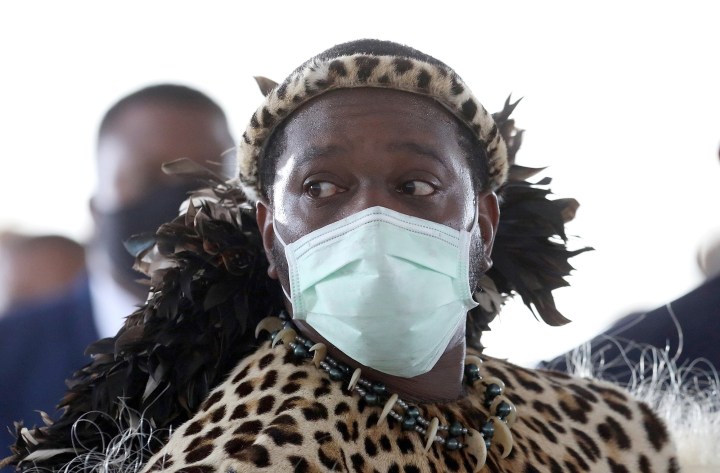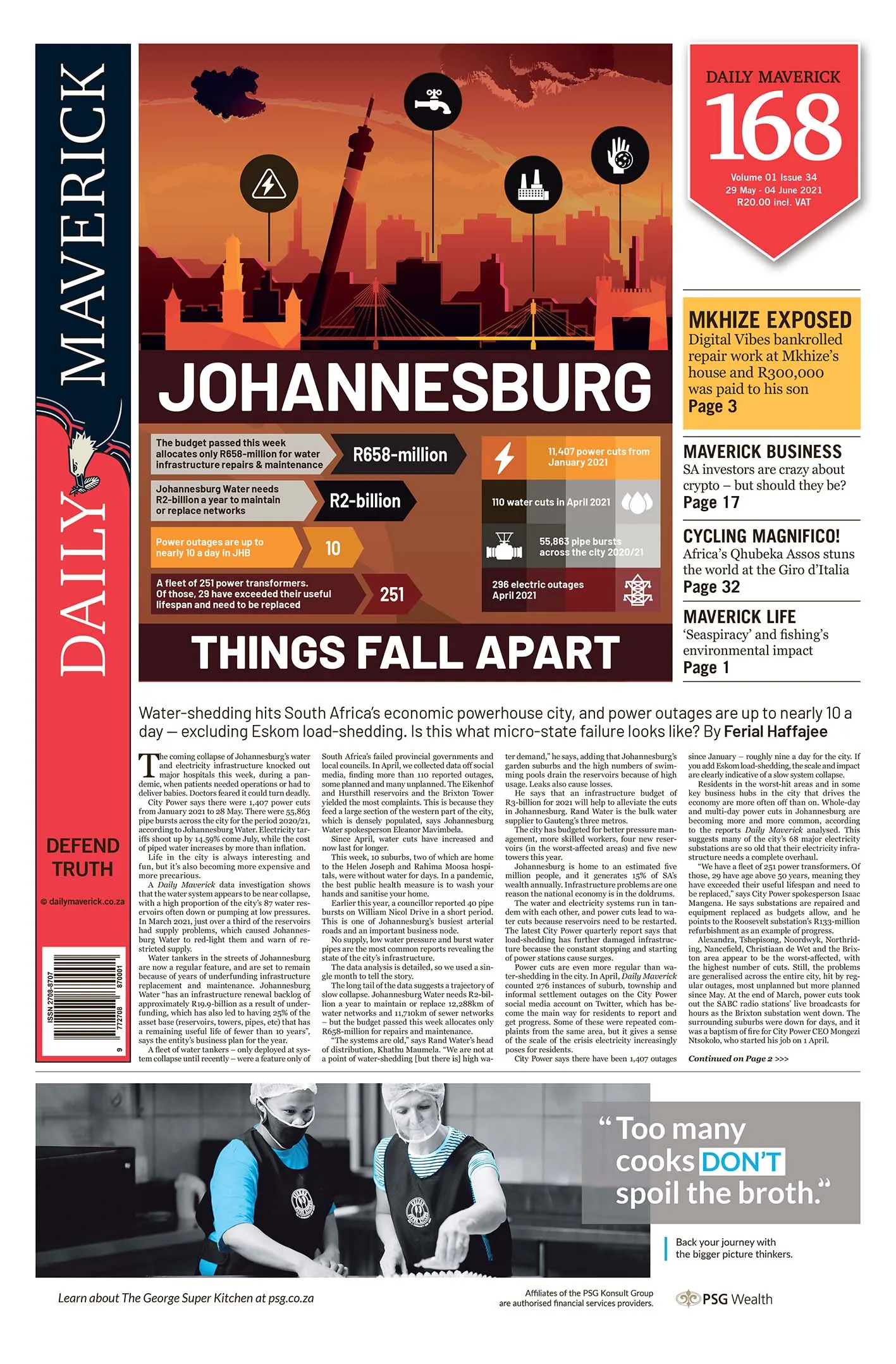DAILY MAVERICK 168
Battle for the Zulu throne is a matter of Royal House Trust and the stakes are much higher

Ongoing legal disputes over the successor to the late Zulu king are unfolding against a backdrop of a R66-million upkeep package funded by the taxpayer and administered by the Zulu Royal House Trust.
First published in the Daily Maverick 168 weekly newspaper.
For the almost 50 years of the late King Goodwill Zwelithini’s reign, the provincial government of KwaZulu-Natal continued to invest in the Zulu monarchy.
After his passing in March, Premier Sihle Zikalala informed King Misuzulu kaZwelithini about the budget that has been allocated to the royal family for this financial year.
However, the succession matter is now in the High Court in Pietermaritzburg, where King Zwelithini’s first wife, Queen Sibongile, and her children are contesting the king’s will and the appointment of Prince Misuzulu as the next king.
There is nothing unusual about that.
For more than two centuries since the inception of the Zulu kingdom, transition from one king to another has been fraught with difficulties. Misuzulu’s ascent to power will be no exception.
But this time around, the stakes are much higher. Besides the prestige of taking his place in the lineage of great Zulu kings going back to the days of King Shaka, Misuzulu stands to become the sole trustee of about 2,883 million hectares of land under the Ingonyama Trust.
The public entity was established by the former KwaZulu government, with the stated mandate to hold the land for the “benefit, material welfare and social wellbeing of the members of the tribes and communities” living on it.
The handling of the affairs of the trust and its very future are matters that the national government is paying close attention to as debate rages about the government’s plan to expropriate land without compensation.
Zwelithini fought for the land held under the Ingonyama Trust to remain untouched. The ball is now in the royal court of his successor.
Royal costs
While the issue of the Ingonyama Trust may be primarily administrative, the upkeep of the royal family has, over the years, attracted negative attention towards the monarchy as an institution.
The new king walks straight into it.
The KwaZulu-Natal provincial government, an entity of the democratic dispensation post-1994, inherited the responsibility to support the Zulu monarchy and members of the royal family from the administration of the erstwhile KwaZulu homeland.
Under the leadership of then KwaZulu chief minister Mangosuthu Buthelezi, who simultaneously was leader of Inkatha Freedom Party (IFP) and traditional prime minister to the Zulu nation and the king, the aim was to enhance and promote the status of the monarchy as a symbol of unity among his people.
The distinction drawn by the former homeland government between the institution of the Zulu monarchy and the person who occupied the seat was often amply demonstrated during times of conflict between Prince Buthelezi and some members of the royal family, who felt that the king could do without the “shackles” of government.
And so it came about that because the IFP had won the first democratic provincial election, the management of the royal affairs remained under the province’s premier.
Zwelithini later famously said that while former President Nelson Mandela had been behind bars for 27 years, he too had suffered under homeland rule.
As was alluded to during former President Jacob Zuma’s appearance in court on fraud and corruption charges this week, Mandela contributed R2-million to a trust fund set up to attend to “confidential” ANC activities.
Schabir Shaik, Zuma’s former financial adviser, said during his 2004 trial that he had been told that the trust was to “raise funds for the care and welfare of tribal leaders and the Zulu royal family”.
The reality was that the king and the royal family did not take kindly to prescripts that dictated how the money allocated to them by the government should be expended and accounted for.
When the ANC finally took power from the IFP in 2004, it grasped the opportunity as the Zulu monarchy’s principal funder to take firm charge of affairs.
The Department of the Royal Household was established under the premier’s office.
The department’s vision was “to enhance and promote the status of the Zulu monarch and to establish the necessary institutional arrangement in support of the Zulu monarchy and members of the royal family”.
The department’s mission was “to create a sustainable, conducive environment for the Zulu monarch in which to lead, develop and protect the Zulu nation”.
Critical to the successful implementation of the vision was the creation of the Zulu Royal House Trust as a public entity. For a variety of reasons, it could not be established until 2018, when legislation was passed to abolish the department and establish the trust.
Now, when the office of the premier’s budget is passed, there is an allocation for the trust.
Zikalala has already visited Misuzulu to inform him that, for this financial year, R66.074-million has been allocated to the royal household.
The premier’s office is responsible for the administrative support of the king regarding his official roles, duties and functions in terms of the KwaZulu-Natal Traditional Leadership and Governance Act.
It also pays his remuneration, subsistence and travel expenses as well as claims for trips he undertakes.
However, it is the President that determines the salaries of South Africa’s kings, queens and traditional leaders. The salary for a king or queen last year was R1,239,918.
The provincial government also pays for praise-singing and speechwriting for the king.
The Zulu Royal House Trust, meanwhile, is responsible for administrative support pertaining to the personal and private activities of the king.
The activities of the queens and other members of the Zulu royal house, which are personal and private, are also provided for by the trust.
The salaries, allowances and benefits for the queens are paid by the trust, as well as school fees for the monarch’s children.
The late king had six wives as well as eight palaces: KwaDlamahlahla, Enyokeni, KwaKhethomthandayo, Ingwavuma, KwaKhangelamankengane, Linduzulu, Ondini and Usuthu.
The trust takes care of the administration, maintenance and management of the royal palaces.
Typically, the work entails renovation and refurbishment, including the construction of new buildings. For instance, water reticulation systems were provided at KwaKhethomthandayo, while a new generator was installed at Ondini palace.
A farming king
A keen farmer, Zwelithini ran three royal farms – Thokazi, Umfolozi and Zwartkop.
The KwaZulu-Natal Legislature was previously told that feasibility studies appeared to rule out prospects of the king’s farms being commercially viable, although the farms continue with subsistence farming activities.
Among the work funded by the government through the trust is Nguni and Boran cattle breeding as well as bean and maize farming. For the current financial year, the Zulu Royal Trust has told the legislature that it will prioritise partnerships in commercial farming and try to identify the type of farming it should focus on.
At its conception, it was envisaged that the trust would investigate the sustainability strengths and opportunities of each palace.
In collaboration with other provincial governments, it was expected that it would identify a role for palaces in generating income and deriving long-term benefits for each of them.
Similarly, the palaces could be utilised as important heritage sites without compromising royal protocols.
Another low-hanging fruit was identified as the enhancement of the Zulu brand through the monarchy’s assets.
The unlocking of the potential for the institution to generate its own income was intended to gradually reduce the reliance of the Zulu monarchy on the public purse.
Cometh the hour for change. But is Misuzulu the man to propel the Zulu royal family to prosperity and self-sustenance, or will the courts determine differently? DM168
This story first appeared in our weekly Daily Maverick 168 newspaper which is available for free to Pick n Pay Smart Shoppers at these Pick n Pay stores.




















 Become an Insider
Become an Insider
Comments - Please login in order to comment.